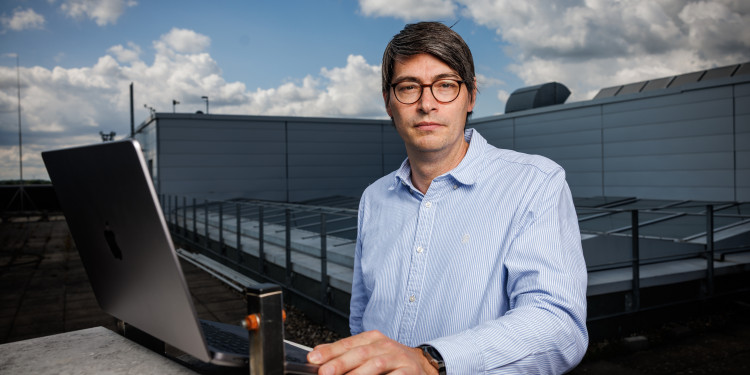
Human, Machine
How do you visualise the work of a (geo)informatics researcher? By travelling to the GEO-I building, for example, speculating on good weather and heading for the roof. Of course, you hope that the protagonist plays along and that the props – a laptop and radio mast – convey the visual idea convincingly. A nice side effect is that you can enjoy the view and the breeze and have a chat about technology and photography with a couple of colleagues. For Prof Dr Benjamin Risse, this project was a good fit – he combines geography, computer-aided image analysis and artificial intelligence (AI) in his work.
Despite the idyll on the roof, the buzzword AI is a problematic term for Benjamin Risse. He feels it is ‘anthropomorphically overloaded’ and that the technology is over-humanised. The 41-year-old knows his stuff and has become a sought-after expert in recent years. ‘My working group at the Institute of Geoinformatics, which currently has 15 doctoral students and three postdocs, has grown considerably due to the ongoing AI hype,’ he explains. As a self-described ‘analytical thinker’, Benjamin Risse neither expected nor planned for this. ‘My approach to computer science stems from my fascination with maths. As universal calculating machines, computers are the ultimate tool for the application of mathematics,’ says the researcher, who studied computer science and biology in Münster and completed his doctorate at the intersection of computer science and neurobiology.
The combination of technology and nature appeals to Benjamin Risse. ‘Take DNA analyses, for example. Humans are not capable of analysing strings of letters that go on for pages – but computers can.’ Computer science, ‘a hybrid of mathematics, engineering and an infinite number of theoretical and practical requirements’, has become necessary for biological progress. In the mid-2000s, however, computer science was initially just a means for Benjamin Risse, who at the time wasn’t sure what his specific profession would be.
He has since found it. After studying and completing his doctorate in Münster and a three-year postdoc in Edinburgh, Scotland, where he ‘witnessed the AI explosion at one of the largest computer science research institutes in Europe’, the Haltern native returned to the Münsterland region as an assistant professor in 2017. He was granted a professorship in 2022 and now heads a working group in geoinformatics, which generally deals with the acquisition, modelling, analysis and visualisation of spatial and temporal data. This involves sensors for recording insects. Or algorithms that use data from autonomous vehicles and drones to create 3D models of the environment. But that’s not all. The working group is also in demand in other specialist areas, such as analysing chemical compounds or in medical informatics, where the focus is on cancer diagnostics, inflammatory diseases or male infertility. Computer science makes many things possible.
In addition to this visually and spatially orientated computer science, Professor Risse is also interested in ‘classical’ computer science. This involves machine learning – one of the foundations of AI. During the conversation, it becomes clear that Benjamin Risse is understandably on familiar ground when it comes to this subject. But he also has an impressive amount to say about non-specialist topics. He vividly weaves chains of association that range from philosophy and sociology to art.
Even if computer science remains the focus of discussion, his digressions reveal a lot about him as a person. Benjamin Risse has a wide range of interests, is passionate about debate, listens and can be persuaded – or is able to convince others. For example, as a sought-after guest at panel discussions. ‘I am easily inspired by questions and ideas,’ he admits. Curiosity and enthusiasm therefore characterise his private life and also benefit him at work. ‘AI working groups are changing a lot: they used to be highly specialised, but today the universal applicability of machine-learning algorithms has massively broadened the scope of research,’ he explains.
The pace of Benjamin Risse’s conversation is fast, but despite all the technical terms and explanations, he never loses sight of his conversation partner. For example, he enthusiastically and clearly explains the basics of computer science to the layperson. It becomes clear why he considers it a privilege to be a university instructor. According to metrics such as ‘ResearchGate’, Benjamin Risse is now not only one of the world leaders in AI research. His office is also home to four awards for excellence in teaching – presented by the University of Münster and the German Informatics Society. Modest and ambitious, fair and disputatious – qualities that Benjamin Risse embodies. But above all, he is committed. There is one problem, however, that neither traditional computer science nor modern AI can help him with: creating more hours in the day to pursue all his tasks and interests even more intensively. If he does manage to do so, he wants to devote himself to the misunderstandings surrounding AI in the future. ‘I want to get to the bottom of some colleagues’ fears in order to promote an enlightened approach to this technology and continue to tackle scientific, geological and medical challenges.’
Author: André Bednarz
This article was publishes in the university newspaper wissen|leben No. 7, 5 November 2025.
